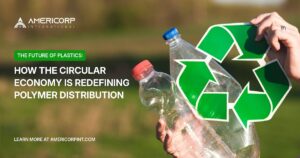The plastics industry has revolutionized various sectors, providing innovative solutions for packaging, construction, automotive, and many other industries. Behind the versatility and adaptability of plastic resins lie a range of additives that play a crucial role in enhancing their performance and functionality. In this article, we will delve into the importance of additives in plastic resins, explore different types of additives, and shed light on Americorpint International’s comprehensive range of additives and their applications across various industries.
1. Introduction
Plastic resins have become an integral part of our daily lives, serving a multitude of purposes due to their unique properties. However, to optimize the performance and functionality of plastic resins, additives are incorporated during the manufacturing process. Additives are substances that are mixed with plastic resins to enhance specific properties, providing greater versatility and reliability in various applications.
2. Importance of Additives in Plastic Resins
Additives are essential in the production of plastic resins as they impart desirable characteristics that are not inherently present. By carefully selecting and incorporating additives, manufacturers can tailor the
properties of plastic resins to meet specific requirements, resulting in improved durability, performance, and aesthetics. Let’s explore some key ways in which additives enhance the overall quality of plastic resins.
3. Enhancing Mechanical Properties
Additives such as reinforcing fillers, impact modifiers, and toughening agents can significantly enhance the mechanical properties of plastic resins. Reinforcing fillers like glass fibers or carbon nanotubes reinforce the resin matrix, increasing its strength and stiffness. Impact modifiers, on the other hand, improve the material’s resistance to impact and prevent it from becoming brittle. These additives ensure that plastic resins can withstand demanding conditions and provide the necessary strength and durability.
4. Improving Thermal Stability
Plastic resins are subjected to varying temperatures during processing and application. To ensure their stability under heat, flame retardant additives are incorporated. Flame retardants prevent or slow down the spread of fire, making plastic resins safer for use in electrical devices, automotive components, and building materials.
5. Enhancing UV Resistance
Exposure to sunlight can cause plastic resins to degrade, leading to color fading, embrittlement, and reduced mechanical properties. UV stabilizers, such as hindered amine light stabilizers (HALS) and UV absorbers, are added to plastic resins to mitigate these effects. By absorbing or scattering harmful UV radiation, these additives help preserve the material’s appearance, strength, and overall performance.
6. Ensuring Flame Retardancy
In applications where fire safety is paramount, flame retardant additives are indispensable. These additives reduce the flammability of plastic resins, making them suitable for electrical enclosures, automotive interiors, and building materials. Flame retardants work by interrupting the combustion process, delaying or preventing the spread of flames and the release of toxic gases.
7. Achieving Color and Appearance Effects
Colorants and pigments are additives used to impart vibrant colors and visual appeal to plastic resins. They offer endless possibilities for customization, enabling manufacturers to create products that align with their brand identity or meet specific consumer preferences. Colorants can be added in masterbatch form or as liquid dispersions during the resin compounding process.
8. Types of Additives
Additives encompass a wide range of substances, each serving a specific purpose in plastic resins. Let’s explore some common types of additives and their functionalities:
Antioxidants
Antioxidants are additives that protect plastic resins from degradation caused by heat, oxygen, and light exposure. They prevent or minimize the oxidation process, which can lead to discoloration, loss of mechanical properties, and premature aging of the material.
Antibacterial Agents
In applications where hygiene is crucial, antibacterial agents are incorporated into plastic resins to inhibit the growth of bacteria and other microorganisms. These additives find applications in healthcare settings, food packaging, and other areas where cleanliness and safety are paramount.
Slip Agents
Slip agents, also known as lubricants or anti-blocking agents, reduce friction between plastic surfaces, improving the processability and handling of plastic resins. They minimize surface tackiness and enable smooth movement during processing, preventing adhesion or blocking issues.
UV Stabilizers
UV stabilizers protect plastic resins from the damaging effects of ultraviolet radiation. They absorb or scatter UV light, preventing degradation and extending the lifespan of plastic products exposed to sunlight. UV stabilizers are widely used in outdoor applications, such as automotive parts, garden furniture, and outdoor signage.
Flame Retardants
Flame retardant additives reduce the flammability of plastic resins and delay the spread of flames. They are crucial in applications where fire safety is a concern, such as electrical enclosures, wire insulation, and building materials.
Colorants and Pigments
Colorants and pigments add color and visual appeal to plastic resins, making them suitable for a wide range of applications, including consumer goods, packaging, and automotive components. These additives offer versatility in terms of color options, effects, and customization.
Plasticizers
Plasticizers are additives used to improve the flexibility, workability, and processability of plastic resins. They increase the material’s elongation, reduce brittleness, and enhance its ability to be molded or extruded. Plasticizers are commonly used in PVC-based products, such as cables, flooring, and flexible packaging.
9. Antioxidants: Preserving Material Integrity
Antioxidants play a crucial role in maintaining the integrity and performance of plastic resins. They inhibit oxidation reactions that can occur during processing, storage, or exposure to environmental factors.
Mechanism of Action
Antioxidants act by scavenging free radicals and reactive species that initiate oxidation. They interrupt the oxidation chain reaction, preventing the formation of harmful by-products that can degrade the polymer structure. This mechanism helps preserve the material’s mechanical properties, color stability, and overall appearance.
Applications in Packaging Industry
In the packaging industry, antioxidants are used to protect plastic resins from degradation caused by heat, light, and contact with food or other reactive substances. They extend the shelf life of packaged products by preventing oxidative rancidity in fats and oils, preserving the freshness and quality of food items.
Enhancing Durability in Construction Materials
Plastic resins used in construction materials, such as pipes, profiles, and roofing membranes, are exposed to harsh environmental conditions. Antioxidants ensure that these materials retain their structural integrity, preventing premature aging, embrittlement, and degradation due to weathering effects.
10. Antibacterial Agents: Promoting Hygiene and Safety
In healthcare settings, food packaging, and other applications where hygiene is crucial, plastic resins can be modified with antibacterial agents to inhibit the growth of bacteria and other microorganisms.
Significance in Healthcare and Medical Applications
In medical and healthcare environments, plastic resins incorporated with antibacterial agents help prevent the spread of infections. These materials are used in the production of medical devices, hospital equipment, and sanitary fittings, ensuring a safer and cleaner environment for patients and healthcare professionals.
Incorporation in Food Packaging
Antibacterial additives find application in food packaging to maintain the hygiene and freshness of packaged food products. By inhibiting the growth of bacteria on the surface of the packaging material, they contribute to extended shelf life and prevent potential contamination.
11. Slip Agents: Reducing Friction and Improving Processability
Slip agents, also known as lubricants or anti-blocking agents, are additives that reduce friction between plastic surfaces. They improve the processability and handling of plastic resins during manufacturing and subsequent use.
Role in Film Extrusion
In film extrusion processes, slip agents are added to the plastic resins to prevent them from sticking to processing equipment or themselves. By reducing the coefficient of friction, slip agents facilitate smooth and efficient film production, minimizing surface imperfections and processing issues.
Enhancing Mold Release Properties
In injection molding and other molding processes, slip agents improve the release of plastic parts from the molds. They reduce the surface adhesion between the resin and the mold, allowing for easier demolding and preventing defects such as sticking or tearing.
12. UV Stabilizers: Protecting Against Sunlight Degradation
Plastic resins exposed to sunlight can undergo degradation, leading to loss of mechanical properties, color fading, and reduced lifespan. UV stabilizers are additives that protect plastic resins from the damaging effects of ultraviolet radiation.
Applications in Outdoor Products
Plastic resins used
in outdoor applications, such as garden furniture, decking, and exterior building materials, are exposed to constant sunlight. UV stabilizers absorb or scatter the UV radiation, preventing its penetration into the material and minimizing the degradation effects caused by UV exposure.
Maintaining Aesthetic Appeal in Automotive Industry
In the automotive industry, plastic resins are extensively used for interior and exterior components. UV stabilizers are incorporated to ensure that these components retain their color stability, glossiness, and overall appearance even after prolonged exposure to sunlight. This helps maintain the aesthetic appeal and durability of automotive interiors and exteriors.
13. Flame Retardants: Ensuring Fire Safety
In applications where fire safety is critical, flame retardant additives are incorporated into plastic resins to reduce their flammability and enhance their fire-resistant properties.
Importance in Electrical and Electronics Sector
Flame retardants are essential in the electrical and electronics industry, where plastic resins are widely used for components such as connectors, cables, and circuit boards. These additives delay the ignition and spread of flames, reducing the risk of fire-related accidents and ensuring the safety of electrical equipment.
Role in Building and Construction Materials
Flame retardant additives are extensively employed in building and construction materials, including insulation foams, wiring conduits, and flame-resistant coatings. By inhibiting the combustion process, these additives help prevent the rapid spread of fire, providing valuable time for evacuation and reducing property damage.
14. Colorants and Pigments: Adding Visual Appeal
Colorants and pigments are additives used to add vibrant colors and visual appeal to plastic resins. They offer an array of options for customization, enabling manufacturers to create products that align with their brand identity or meet specific consumer preferences.
Impact in Consumer Goods Industry
In the consumer goods industry, colorants and pigments allow for product differentiation and aesthetic appeal. From toys and household appliances to cosmetic packaging and kitchenware, these additives enhance the visual attractiveness of plastic products, making them more appealing to consumers.
Customization in Automotive Design
In the automotive industry, colorants and pigments play a crucial role in achieving desired aesthetics and brand recognition. From vibrant exterior colors to intricate interior detailing, these additives allow automotive manufacturers to customize the appearance of their vehicles, creating unique designs that captivate consumers.
15. Plasticizers: Enhancing Flexibility and Workability
Plasticizers are additives used to enhance the flexibility, workability, and processability of plastic resins. They improve the material’s elongation, reduce brittleness, and facilitate molding and extrusion processes.
Applications in PVC-based Products
Plasticizers find widespread use in polyvinyl chloride (PVC)-based products, such as cables, vinyl flooring, and flexible hoses. By incorporating plasticizers, these materials become more pliable, easier to process, and resistant to cracking or breaking under bending or impact.
Balancing Mechanical Properties in Flooring
In flooring applications, plasticizers are added to PVC-based materials to achieve the desired balance between flexibility and strength. These additives enable the production of resilient and durable flooring products that can withstand foot traffic, resist abrasion, and provide comfort underfoot.
16. Americorpint International’s Range of Additives
Americorpint International is a leading international trade and distribution company specializing in plastics and industrial chemicals. They offer a comprehensive range of additives that cater to various industries and applications.
Antioxidant Solutions
Americorpint provides a wide selection of antioxidant solutions designed to protect plastic resins from degradation. Their antioxidants enhance the longevity and performance of plastic products, ensuring they maintain their desired properties over time.
Antibacterial Additives
Americorpint offers antibacterial additives that inhibit the growth of bacteria and microorganisms on plastic surfaces. These additives find applications in healthcare
, food packaging, and other industries where hygiene and safety are paramount.
Slip Agent Products
Americorpint’s slip agent products reduce friction between plastic surfaces, improving processability and enhancing the overall quality of plastic resins. They enable smooth movement, minimize adhesion issues, and optimize the manufacturing process.
UV Stabilizer Portfolio
Americorpint’s UV stabilizers protect plastic resins from UV-induced degradation, preserving their appearance and performance. These additives are suitable for a wide range of outdoor applications, providing long-term durability and resistance to sunlight exposure.
Flame Retardant Solutions
Americorpint offers flame retardant additives that enhance the fire-resistant properties of plastic resins. These solutions comply with rigorous safety standards and help manufacturers meet fire safety regulations in various industries.
Conclusion
In conclusion, additives play a vital role in enhancing the performance and functionality of plastic resins. By incorporating the appropriate additives, manufacturers can tailor the properties of plastic resins to meet specific requirements. From improving mechanical properties and thermal stability to providing UV resistance and flame retardancy, additives offer a wide range of benefits. Americorpint International, with its extensive range of high-quality additives, provides valuable solutions to industries seeking to optimize the performance and functionality of their plastic products.








